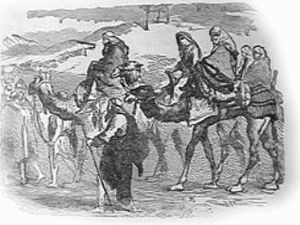Exodus
The Book of Exodus
Exodus gets its name from Ancient the ancient Greek term Ἔξοδος which was Romanized to Éxodos which we write as Exodus today.
It is the second book of the Bible which narrates the story of the Exodus of the Israelites leave the Biblical bondage of Egypt through the the power and wisdom of a God identified by Moses as Yahweh.
Jacob's sons who had sold their brother into bondages join their brother Joseph in Egypt with their families because of a dearth in the land. They were at that point in the bondage of Egypt employed by the Pharaohs forever since one-fifth of their labor and the labor of the people in Egypt now belonged to the governments of the Pharaohs.
Based on the Masoretic Text some believe they were in Egypt for four hundred years but the earlier Hebrew text says they were in Egypt and Canaan for four hundred years, not just Egypt.
The time frame of Moses and this exodus comes into series conflict with the modern acceptance of dates of Egyptian dynasties and kingdoms. More is still being discovered by modern archeologists that seems to contradict many of the conclusions about the past which brings the validity of the biblical text into a much more credible context but the old school of archeologists are slow to alter their thinking.
The story begins with a new Pharaoh, who does not remember how Joseph had saved Egypt from famine and gave his kingdom the power to tax the labor of his people through the fall out of a famine. He begins to oppress the people of Israel and instituted systems of forced tribute or corvee and a institutions of social welfare that weakened the people.
These institution put such heavy burdens on the people that that casting out their own children through peccaries and infanticide altered the demographics of Israel.
The Way Out =
It is during this time that Moses was timely generated and hid by his mother a Levite woman who sets him adrift on the river Nile in a waterproof basket or ark of bulrushes. Pharaoh's daughter finds the child, names him Moses, and out of sympathy and love adopts the Hebrew boy, brings him up as her own, hiring the natural mother as a nanny.
The Greek word éxodos literally means the way out but the Hebrew name of this Book of Exodus is the word שְׁמוֹת Šəmōṯ which is said to mean "Names". In Hebrew the word name has more meaning than our modern term but has to do with the identity of the heart and mind of a thing or individual. The root word shem consisting of two letters ShinMem means name but the word Šəmōṯ includes the letters ShinMemVavTav which includes an idea connected to Faith.
Who Moses was in Egyptian History, why he left Egypt and why he came back to free those who would follow the way of Yahweh and exactly what that way consists of is controversial. Exploring what the meaning of words are will be important but exploring our own hearts and minds will be critical in order for us to find our way out.

Exodus | Exodus 1 | Exodus 2 | Exodus 3 | Exodus 4 | Exodus 5 | Exodus 6 | Exodus 7 | Exodus 8 | Exodus 9 | Exodus 10 | Exodus 11 | Exodus 12 | Exodus 13 | Exodus 14 | Exodus 15 | Exodus 16 | Exodus 17 | Exodus 18 | Exodus 19 | Exodus 20 | Exodus 21 | Exodus 22 | Exodus 23 | Exodus 24 | Exodus 25 | Exodus 26 | Exodus 27 | Exodus 28 | Exodus 29 | Exodus 30 | Exodus 31 | Exodus 32 | Exodus 33 | Exodus 34 | Exodus 35 | Exodus 36 | Exodus 37 | Exodus 38 | Exodus 39 | Exodus 40 |
Preceded by: Genesis - Followed by: Leviticus
Audio and Video Archives
2024 |
2023 |
2022 |
2021 |
2020 |
2019 |
2018 |
2017 |
2016 |
2015 |
2014 |
2013 |
2012 |
2011 |
2010 |
Misc |
AllAud |
Broadcasts |
Books |
Bible |
Videos |
YouTube
Keys of the Kingdom Audio Archive
Bible |
Bible Index |
Bible References |
Biblical bunch |
Sophistry |
Modern Christians |
Whosoever believeth |
Religion |
Bible_terms |
Early non Bible authors
Athenagoras of Athens | Methodius of Olympus | Theophilus or Ignatius of Antioch
Hippolytus of Rome | Justin the Martyr | Jerome | Augustine of Hippo |
Epistle of Mathetes | Gospel of James | The Gospel of Thomas |
Philo Judaeus or Philo of Alexandria and The Allegories of the Sacred Laws
Polybius | Plutarch | Seneca | Tacitus | Suetonius |
Marcus Tullius Cicero | Celsus | Diotrephes |
People in the Bible
Paul the Apostle |
Melchizedek |
Moses |
Cain |
Caesar |
Herod |
Jesus |
John the Baptist |
Matthew |
Mark |
Luke |
John |
Nimrod |
Abraham |
Essenes |
Pharisees |
Sadducees |
Zealots |
Julius Caesar | Augustus Caesar | Tiberius | Nero |
Historical People
Buddha |
Constantine |
Eusebius |
Ambrose |
Augustine of Canterbury |
Lady Godiva |
Vespian |
Diocletian |
Manichaeism |
John Wycliffe |